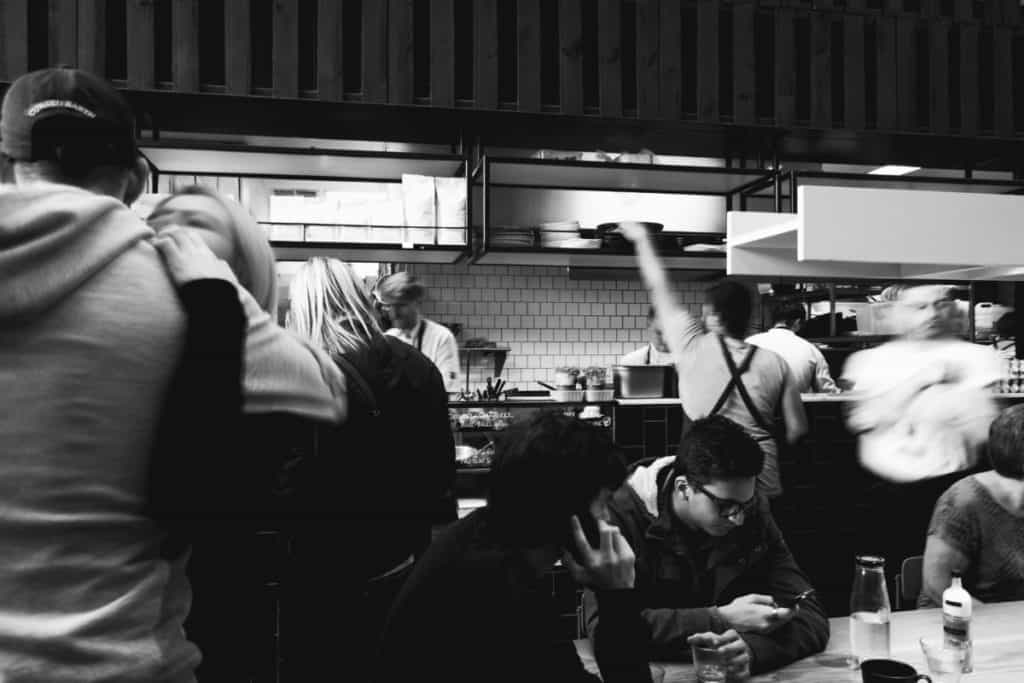
A career as a chef is famous for long and unsociable hours. I’ve noticed when looking online that it can be very difficult for those wanting to become a chef to gauge a true reflection on how many hours chefs are expected to work.
to gauge a true reflection on how many hours chefs are expected to work.
Therefore, using my own experience as a chef I have put together this article so readers can get a fair and unbiased view of how many hours chefs work which will hopefully help you decide if a chef career is a good choice for you.
As a chef, I typically worked around 10-12 hours per day, made up of either a straight or split shift. This equates to 50-60 hours per week on average for a 5 day week. However, due to the working rota, I often had to work up to 10 days in a row between days off.
These 10 days in a row equated to around 100-120 hours of work in between rest days!
As readers can see, chefs typically work a high number of hours in a week, particularly if a chef’s days off happen to fall at opposite ends of the two-week rota. If the large number of hours discussed in this article don’t put you off from becoming a chef then you may need my favourite beginner-friendly chef knife, linked to on Amazon here, which is more than adequate to get your career off to a great start!
Read on to discover the details of how many hours chefs work and what shift patterns chefs work. This will help explain why we tend to work such long hours in kitchens.
How Many Hours Do Chefs Work In A Shift?
Understanding the shift patterns which we work as chefs is an important part of learning why chefs work such long hours.
It goes without saying that every restaurant is slightly different when it comes to its working hours for kitchen staff. However, there are general trends in catering and common shift patterns that are adopted by a large number of kitchens.
The typical shift patterns a chef may work in a day are;
7am – 3pm, The Breakfast Shift
Some chefs (in large hotels especially) will be breakfast chefs only. They will come in to cook the breakfasts in the morning and help with lunch service as well.
Lots of chefs don’t like cooking breakfasts as they find it repetitive, but the payoff is the chance to have a night off!
7am – 6pm, The Day Shift
Breakfast plus prepping for evening service and any functions. This shift is typically used when there is extra prep work that needs doing in a day and the breakfast chefs are asked to stay on and help.
A common shift if there is a wedding party or other function.
2pm – 11pm, The Straight Shift
This is a common shift in kitchens with a larger number of chefs. A lot of the kitchen staff will come in at this time to prepare the food all afternoon ready for the evening service.
The finish time is dependent on the restaurant’s close time but 11 o’clock is a reasonable average to take.
9am – 2pm, 5pm – 11pm, The Split Shift
The most common shift among professional chefs!
A chef will work the morning prepping and then deal with lunch service. They will then have a few hours break before returning to prep some more and do the evening service.
The start and finish times are very changeable. It is up to each member of the kitchen to manage their own daily workload and decide how long a break they can take.
9am – 11pm: AFD, (All F*#king Day)
Believe it or not, a common terminology any chef will be familiar with is AFD.
AFD on the rota lets the chefs know that they are very busy and the Head Chef is not expecting them to be able to take their afternoon break.
Sometimes AFDs are self-imposed as a chef may have so much prep to do that to go for a break would leave them with real difficulties during the evening service.
As a chef, I typically worked around 10 – 12 hours per day. This is due to the fact that the most common shift pattern I would work in a kitchen was a split shift as explained above!
I wrote a whole article dedicated to the subject of a typical working day for a chef , linked here.
, linked here.
How Many Hours A Week Do Chefs Work?
In my career as a chef, a typical working week would be around 50 to 60 hours per week. However, the working rota for that week had a huge impact on the number of hours I had to work.
A restaurant is usually open 7 days a week. A rota is produced at the start of each week so that there is always enough staff working on each day.
On a rota system, chefs’ days off are moved around to allocate the ‘good days off’ fairly.
It wouldn’t be fair if the same chefs always got Friday and Saturday off for example. This swapping around rest days can lead to a large number of working days in between days off.
I have produced a very basic rota below (in a small kitchen with only two chefs!) to illustrate this point.
- Week 2 is the week following Week 1 and to keep it simple I have just used In (for in work) or Off (for day off work).
| Sun | Mon | Tues | Wed | Thurs | Fri | Sat | |
| Dave | In | In | In | Off | Off | In | In |
| Shaun | Off | Off | In | In | In | In | In |
| Sun | Mon | Tues | Wed | Thurs | Fri | Sat | |
| Dave | In | Off | Off | In | In | In | In |
| Shaun | In | In | In | In | In | Off | Off |
As readers will be able to see, poor Shaun has to work 10 days in a row. When you consider the daily shift patterns discussed earlier it becomes clear this can be physically demanding , and maybe explains some of Chefs’ perceived grumpiness!
, and maybe explains some of Chefs’ perceived grumpiness!
In reality, a small kitchen like the above example would tend to close for a couple of days a week. Usually, by picking a quiet two days (typically Monday and Tuesday) both chefs have the same days off and only ever have to work 5 in a row.
The obvious disadvantage to the chefs is that they don’t ever get a weekend off to enjoy!
is that they don’t ever get a weekend off to enjoy!
I’ll put a note here that it’s these odd days off that help create a great team spirit among chefs outside of work.
For example, if a chef has a Monday off and their partner is at work, chances are they will meet up with one of their chef friends (that also have that Monday off) and go for a drink together.
How Many Hours Do Chefs Get For Break?
As a chef, I typically had a break of around 2 hours in the middle of the day. However, if work was very busy or there was lots of prep work that needed to be done, then I would not be able to take a break that day.
Chefs are responsible for managing their own workload and the length of break they take depends on their own judgement.
It’s this own judgement that is the main reason why a chef wouldn’t take a break. This also helps to explain why so many chefs choose to smoke.
Head Chefs or Sous Chefs
or Sous Chefs don’t often state that a chef cannot take a break. However, if it is busy and a chef is leaving the kitchen for a break, a Head Chef will seek assurance that they are prepared and ready for service.
don’t often state that a chef cannot take a break. However, if it is busy and a chef is leaving the kitchen for a break, a Head Chef will seek assurance that they are prepared and ready for service.
This questioning can be a little intimidating and a chef may decide it’s safer just to forgo their break.
When we do get a few hours off work as a brigade of chefs, this can be great for team bonding. I personally have spent many split shift breaks playing golf in the sunshine or drinking coffee chatting with colleagues.
Do All Chef Jobs Have Long Hours?
Whilst in my experience most chef jobs have long hours, there are some positions available with fewer working hours. Restaurants that only serve meals at lunchtime, large venues such as sports stadiums, and food trucks are all great places to look for chef jobs with fewer hours.
As readers can see from above there are options for those who have a passion for cooking but who don’t want to work excessive hours. The trade-off for the reduced hours can be a lower level of cuisine being produced (a chef will struggle to find a Michelin star kitchen that has low hours for example.) However, this is not always the case.
that has low hours for example.) However, this is not always the case.
There are more and more surprising places that a chef can work . Although the hours may still be long the location can more than makeup for it!
. Although the hours may still be long the location can more than makeup for it!
Owning a food truck can be a great way for experienced chefs to produce excellent food that they are passionate about, whilst also allowing them the freedom to work the hours they choose.
To Sum Up
Anyone entering the world of professional cookery should be realistic about the long working hours that are common. Having said that, more modern kitchens are recognising the need to give chefs more time off and the industry is starting to move towards providing kitchen staff with a better work/life balance.
